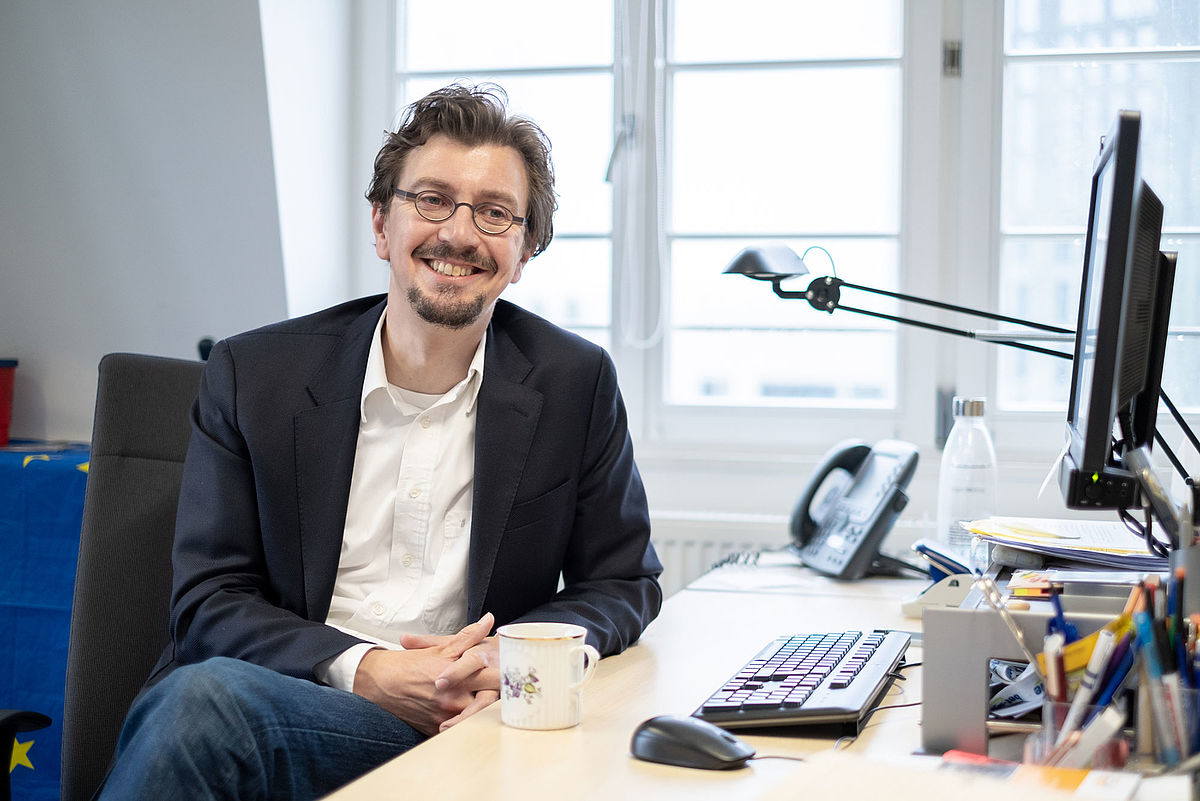Professor Daniel Göler holds the Jean Monnet Chair for European Politics at the University of Passau. His research focus is on all matters concerning European integration, including the Common Foreign, Security and Defence Policy. Together with Professor Thomas Wünsch, a scholar of Eastern European history, he is part of a Jean Monnet Network, which brings together EU universities and the Eurasian Economic Union. On Wednesday, March 9th, he is due to speak on the occasion of the visit of the French Consul General of France Corinne Pereira who will be presenting France's European vision in the Audimax of the University of Passau.
The day after the Russian invasion, I held a joint online seminar on strategic thinking in foreign and security policy with my colleague Dr. Kristina Kurze from our partner university Andrássy University Budapest. Many students from Central and Eastern Europe participated in the discussion, including students from Ukraine. One Ukrainian student explained how she saw her country's current situation. That really gets to you. I was also impressed by her reports about the resolve people in Ukraine are showing in their efforts to oppose Russian aggression.
In the seminar, we also spoke about the Paneuropa Manifesto of 1923, which called on the European peoples to prevent future wars through cooperation and integration. One passage reads as follows: "Answer those who make a new Europe contingent on changes to today's borders, that any modification of these borders is only possible through general war and ruin […and] that stable borders in Europe are achievable whereas just borders are unachievable." This rallying cry, which dates back nearly one hundred years, appears to be more relevant than ever before in view of the Russian president's infringement of Ukraine's territorial integrity on historical grounds.
We Europeans need to advocate what French President Emmanuel Macron underscored four years ago in his Sorbonne speech: European sovereignty
Professor Daniel Göler, Head of the Jean Monnet Chair for European Politics
In the current crisis, it may actually be useful for Europe to hark back to its beginnings. In addition to the desire for peace, which was to be achieved by overcoming internal differences, and economic motives, European integration in the 1950s was clearly also a closing of ranks against an external threat – i.e. the Soviet Union at the time. We Europeans need to advocate what French President Emmanuel Macron underscored four years ago in his Sorbonne speech: European sovereignty. We need to combine our strengths in foreign and security policy and should no longer rely as much on the US. It does not bear thinking how the situation would have been had Donald Trump still been US president.
The first steps to stronger cooperation in this field have been taken. They include what is know as the Permanent Structured Cooperation, the European Defence Fund or the Strategic Compass, which is currently in the pipeline and where member states will analyse threats and define common security policy challenges. The EU must ask itself what future approach it plans to adopt in relations to Russia now that Russia can hardly be considered a partner any longer.
In this situation, it is important to underscore that the EU has for the most part been consistent and resolute in its response to the crisis. This has been all the more remarkable as there have been very divergent positions in the EU with regard to Russia. There is currently a feeling that the external threat has had an integrating effect within the EU, an effect that we have been able to observe on several occasions in Europe's history of integration and that gives us hope for the future."
Do you have any questions about the attack on Ukraine? Contact us at: frag-die-wissenschaft@uni-passau.de - we will forward your questions and publish answers from researchers here in a timely manner.




